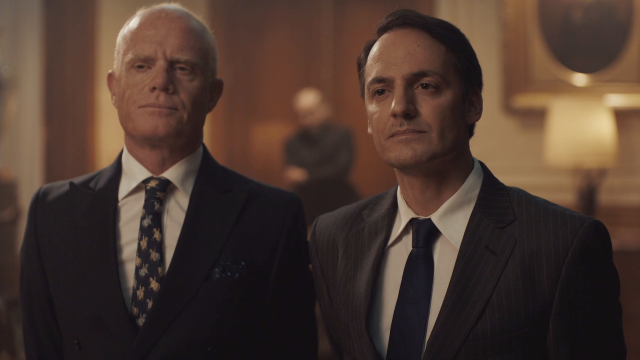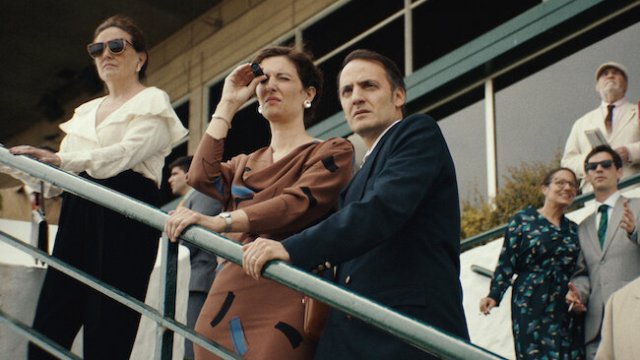Azor is a combination of slow drama and political thriller created in an international co-production of Argentina, France and Switzerland signed by Andreas Fontana in his directorial and screenwriting debut. The film premiered at the Berlin Film Festival when it was bought by the Mubi streaming platform. The title of the film refers to a French word which in translation means “be quiet”.
The plot of the film follows Ivan de Vila, a private banker from Geneva who came to Argentina in the late 1970s with his wife, where a military dictatorship rules. The aim of the visit is to complete the work started by Keys, his partner who became the subject of worrying rumors and who mysteriously disappeared overnight. Moving under intense surveillance through smoky salons and lavish celebrations, Ivan slowly discovers the sinister network of colonialism, high finances and the “dirty war” of the nation.
According to the author, he found inspiration in the letters of his grandfather, who, like our protagonist, was a Swiss private banker who was in Argentina on business at the time of the film. The letters were of a simple nature, everything was down-to-earth and “banal” and in them the man described a typical business trip in which some contracts were made and money was earned – there was not the slightest indication of the horrors unfolding in Argentina.

Ivan’s role is to reconnect with the client portfolio and to discreetly discover what happened to Kizu in order to clarify those rumors. It turns out that the portfolio is a colorful array of characters made up of military personnel, landowners, lawyers, diplomatic staff and other officials characteristic of the elite of the military dictatorship. Certain surnames have a weight equivalent to titles like president or general, and there is also Monsignor Tatoski, who controls much more from the shadows than one would expect from a church person. Everything takes place in a world of views under the eyebrows, open paranoia and hidden threats.
Ivan carefully investigates the disappearance of his partner, gradually discovering that Kiz’s methods of work and interference in politics have upset certain people in Argentine high society. Contrary to my expectations, our protagonist is not so much interested in finding Keys as in preserving the business of his bank, which is endangered by the growing competition of state or public banks. He charmingly and discreetly infiltrates the elite of Argentina, leaving the impression of an unwavering businessman, but he is tormented by the suspicion that Keys was a better banker than him and that he could tarnish the good name of his family with one bad move. His wife has the function of Lady Macbeth, whose comments encourage his determination.
According to Monsignor Tatoski, Argentina was in the middle of a purge phase during which parasites (leftists and dissidents) must be eradicated. Ivan sees this at the very beginning of the film, and later we learn that his clients are not protected either because the daughter of one of them has disappeared. It will turn out that the military dictatorship is an excellent potential partner for Ivan, because the revenues of Ivan’s bank directly depend on its efficiency. That is why Ivan, like his clients, is indifferent to the brutality that is being perpetrated against the people of Argentina.

The film itself is set in locations that perfectly reflect the banality of evil (huge rural estates, elite private clubs, elegant hotels), so the plot takes place far from the socio-political tensions that gripped the country – we do not see open violence, but it is clear the state is bleeding. The central mystery surrounding Kiz’s disappearance eventually becomes completely irrelevant because he probably fell victim to the people Ivan does business with – on the other hand, that’s why our protagonist at the end of the film doesn’t achieve a transformative discovery about capitalism but a catharsis of relief and complacency. did his job.
Azor is an unobtrusive, slow-moving political thriller without action or great discoveries that effectively presents us with the Argentine military junta in which death is everywhere except on the screen. Final grade: 7/10
MORE MOVIE REVIEWS: SOME LIKE IT RARE / BARBAQUE (2021, FRA) Movie review, plot, trailer